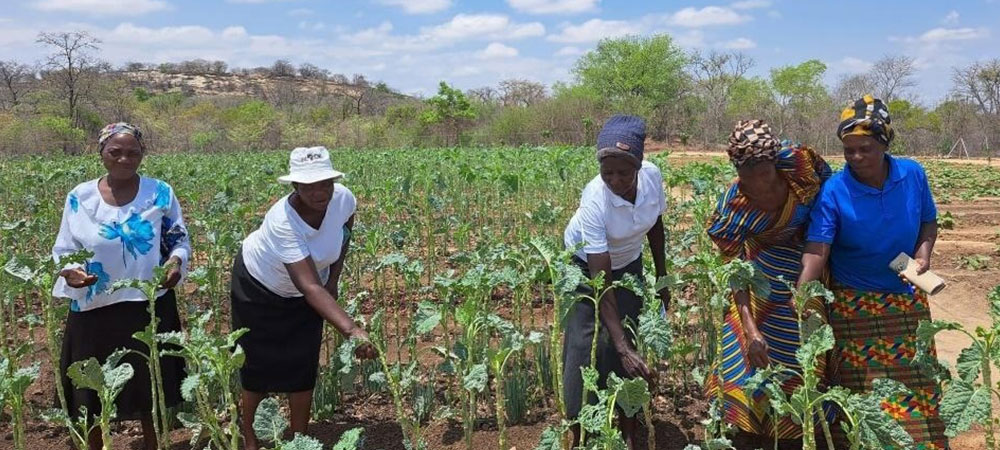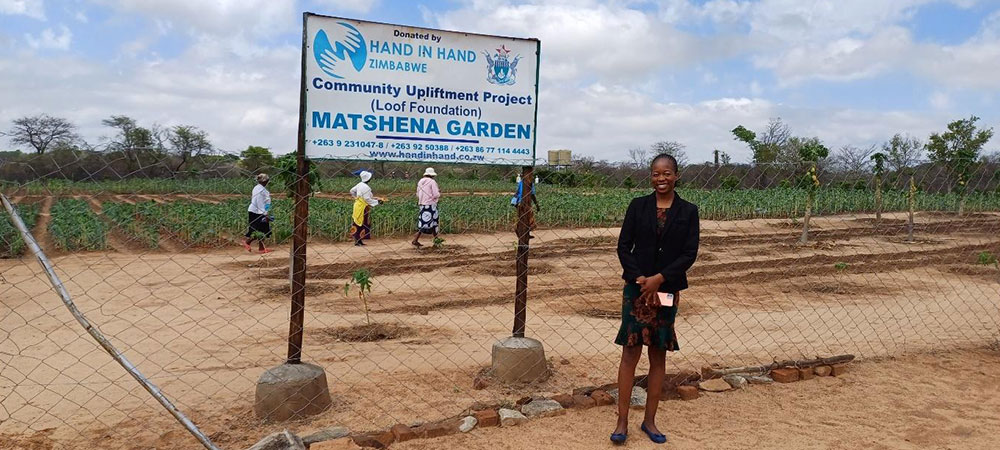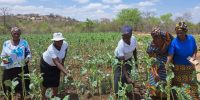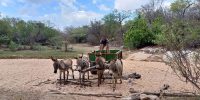Hand in Hand Zimbabwe, 2022 - Ongoing
HAND IN HAND IS A NON-PROFIT ORGANISATION THAT LÖÖF FOUNDATION CONTINUES TO SUPPORT. THROUGH THEIR COMMUNITY UPLIFTMENT PROGRAMS, THEY WORK TO HELP UNDERPRIVILEGED COMMUNITIES BY CREATING BETTER LIVES THROUGH JOB CREATION AND ENTREPRENEURSHIP IN ORDER TO INCREASE ECONOMIC OPPORTUNITIES.
Hand in Hand, the non-profit organisation we’ve fervently supported in India and Zimbabwe, remains at the forefront of uplifting underprivileged communities. By igniting the entrepreneurial spirit and fostering job creation, Hand in Hand has been a beacon of hope for women and youth in rural communities, carving out better, sustainable livelihoods.
The southern African country of Zimbabwe has a population of 15-million people – including some of the most vulnerable communities in the world. Zimbabwe’s economic decline was due to hyperinflation and a currency crash following a failed land reform crusade under the rule of first president Robert Mugabe. Many citizens have been forced to leave in search of jobs in neighbouring countries. Those who are left rely mostly on the land around them for self-sufficiency – and are totally at the mercy of the harsh climate.
The journey of Zimbabwe, amidst challenges like food insecurity, the crumbling economy and climate change effects, stands testament to the resilience of human spirit and collective effort. As the nation grapples with soaring inflation and skyrocketing basic commodities, Hand in Hand’s sustainable interventions are vital.
In 2022, Lööf Foundation began supporting Hand in Hand’s mission in Simbumbumbu Village, Gwanda District – a community crippled by extreme poverty, high-unemployment, and a staggering poverty prevalence rate of 73%. The crisis was further exacerbated by severe drought and climatic extremities.
Our support has breathed new life into Simbumbumbu Village. The community now enjoys access to fresh running water, while improved cultivation techniques have brought a newfound sense of self-sustainability through the Matshena Garden Community Upliftment Project.
Matshena Garden is run by a group of 26 villagers, of whom 20 are women. What was once an area of sparse bush, has now been cleared and cultivated into a community food garden. With funding from the Lööf Foundation, Hand in Hand was able to invest in two JoJo-tanks, a solar-powered water pump and pipes for the garden. The result is a productive garden that gives the villagers both nutritious food and income from selling surplus produce.
HAND IN HAND IN ACTION
Business Development Training: Hand in Hand provides comprehensive training to newly mobilised Self-Help Group (SHG) members in entrepreneurship and existing SHGs in business development, fostering a strong foundation for sustainable businesses.
Technical Skills Training: Multi-disciplinary training sessions range from tree nursery and orchard management to horticultural production and confectionery baking, equipping community members with diverse technical skills that enhance their livelihoods.
Market Linkages: Detailed market research is conducted to aid in establishing connections between local businesses and larger markets. This promotes business expansion and ensures the sustained success of enterprises.
Monitoring Visits: We perform regular on-site monitoring visits, providing a continual assessment tool that enables us to detect and remedy issues promptly, ensuring the viability and success of our projects.
Hardware Support: We provide crucial infrastructure support, including solar-powered water systems and fencing material, enabling communities to effectively engage in horticultural production activities.
Vegetable Washing Facilities: We have constructed washing facilities that promote hygiene and ensure the quality of produce sold in the market.
Branding and Packaging Material: To enhance marketability and product appeal, we have procured branding and packaging materials for SHGs to use with their fresh and value-added agricultural produce.
Current Crop Production: Hand in Hand monitors and guides the crop production at Matshena Garden, which currently includes butternuts, leafy greens, sugar beans, onions, tomatoes and cabbage. The garden also contains a nursery where cuttings are being grown for tree saplings – including mostly lemon trees but also mango, orange and papaya trees. These trees are being planted within the community or sold for profit.
Community Engagement: We foster community connections and enrich local ecosystems by donating tree seedlings to primary schools and SHG members.
Livestock Expansion: Additionally, there is now a chicken house where they are raising 200 broilers within the garden. Plans are underway for a micro-fish farm and digging has begun for the fish pond.
Future Expansion: Matshena Gardens has got approval from the local community to expand the area of the garden, which they are able to do if we continue our financial support. To protect against the threat of droughts, they are looking for funding to construct a sand dam in the river as well as buy an additional JoJo-tank.
Matshena Gardens has had a positive impact on living standards for those involved. These initiatives have led to a surge in micro-enterprises, demonstrating that with the right support and resources, communities can lift themselves out of poverty. Many shared that they no longer struggle to pay school fees and now have a reliable nutritious food supply. They can support their families, educate their children, and start believing in a better, brighter future.
As we continue to partner with Hand in Hand, our mission remains clear – to transform lives by creating sustainable jobs,
enhancing entrepreneurship, and fostering economic opportunities in these underprivileged communities.















